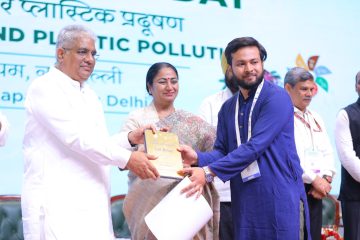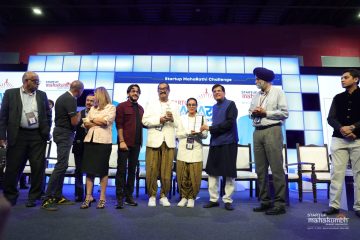
On March 26 2019, the Director of IIT Kharagpur, Prof. Partha Pratim Chakrabarti, proudly flagged off a truck bearing a small hoarding which said, “Technology Transfer to the Government of Tripura”. The vehicle carried a consignment of five machines produced by the Rural Design Innovation Centre of IIT Kharagpur. In it were four gas-based puffed rice (muri) making machines and one motorized dehusker or dhenki in Bengali.
This is the third consignment that is making its way to distant Agartala. A total of 22 machines have already been transported through earlier consignments, says Prof. P.B.S. Bhadoria, Coordinator of the Design Innovation Centre of IIT Kharagpur and Rural Technology Action Group-Eastern India. He heads the multi-disciplinary team at the Institute that has been working hard to make a difference to the lives of the rural population by introducing new rural technology that make their work easier or upgrading the technology that is already in use.

The two units in IIT Kharagpur making this possible are the RuTAG-EI and DIC. The first was set up in 2008 and the second in 2016 as part of the MHRD, government of India’s National Initiative for Design Innovation. The Design Innovation Centre has connected with more than 50 NGOs in West Bengal, Odisha, Jharkhand and Bihar, several self-help groups and individual beneficiaries, and devised technological innovations that have improved the life and livelihood of clusters of rural population in these states. The Design Innovation Centre of IIT Kharagpur sponsored by MHRD, working in the hub and spoke model – IIT Kharagpur being the hub and IIEST Shipur, NIT Jamshedpur and NIT Patna being the three spoke centres – have also made important contributions.
Prof. Bhadoria says that the centres work in close connection with NGOs and self-help groups that help the team to identify areas where intervention is required. “They voice the need and we provide the solution,” says Prof. Bhadoria. Often the individuals who use the technology work together with the team, as happened during the time they were devising the Motorized Single Twist and Double Twist Jute Rope Making Machine. The machine devised by DIC has increased productivity by 500g/hr and is also being used in Tripura. Government of Tripura and Ministry of Development of North Eastern Region (MDoNER) has invested around Rs 40 lakh for the machines.
The North-East, in fact, figures prominently in the enterprise of both the IIT Kharagpur units. The MDoNER is in collaboration with IIT Kharagpur. MDoNER is willing to adopt and disseminate technologies like muri making, feed block making through different schemes/livelihood projects.

Biomass-based and LPG based puffed rice making machines are one of the most popular products of IIT Kharagpur. The others are motorized pottery wheel, mechanized dehusker or dhenki, Rice flaking (chiwra) machine, motorized jute rope making machine and motorized Sabai Grass rope making machine. Of these the puffed-rice making machine are the most expensive. Till now the units have developed close to 35 products, and filed for 32 patents. They have transferred technologies to both NGOs and individuals, many of these in and around in the villages of IIT Kharagpur itself.
As part of the Unnat Bharat Abhiyan, IIT Kharagpur has transferred many of these technologies in the villages of Kenthia, Balijuri, Bhimpur and Porapara along with interventions in the natural resources management, organic farming, post-harvest processing technologies, storage and non-farm technologies. These have been well received by the local people.
“The idea is to do simple things so that the work can be done efficiently, drudgery can be reduced, and consequently productivity is increased. The quality of life naturally improves,” Prof. Aditya Bandopadhyay of the Mechanical Engineering Department pitches in. The Electrical Engineering Department, the Electronics and Electrical Communications Engineering, the Department of Industrial and Systems Engineering and the Rajendra Mishra School of Engineering Entrepreneurship all contribute to the efforts. The last two run courses that cater to the ergonomic design/improvement of products, processes, product development, safety and quality engineering, product analytics and modelling, reverse engineering, and promote entrepreneurship. Prof. Nirupama Mallick, Prof. E.V. Thomas, Prof. Rajendra Singh, Prof. Hifjur Raheman, Prof. Dillip Kumar Swain of the Department of Agricultural and Food Engineering and Prof. Vikranth Racherla of the Department of Mechanical Engineering are the other members of the team evolving such technologies.

Even then there is shortage of hands, say both Prof. Bhadoria and Prof. Bandopadhyay. The demand far outstrips the supply and there are not many hands going around for the fabrication of the machines. They have entered into an arrangement with STEP and are looking out for entrepreneurs to fabricate the machines. “We can then concentrate on making the prototypes,” says Prof. Bandopadhyay. Every day there are calls from distant shores – as far away as Malaysia, California and even Dubai. And of course, call for more consignments to deliver to the hills of Tripura and perhaps increasingly other North Eastern states where there simple machines will make a major difference.
Photo banner: Suman Sutradhar



